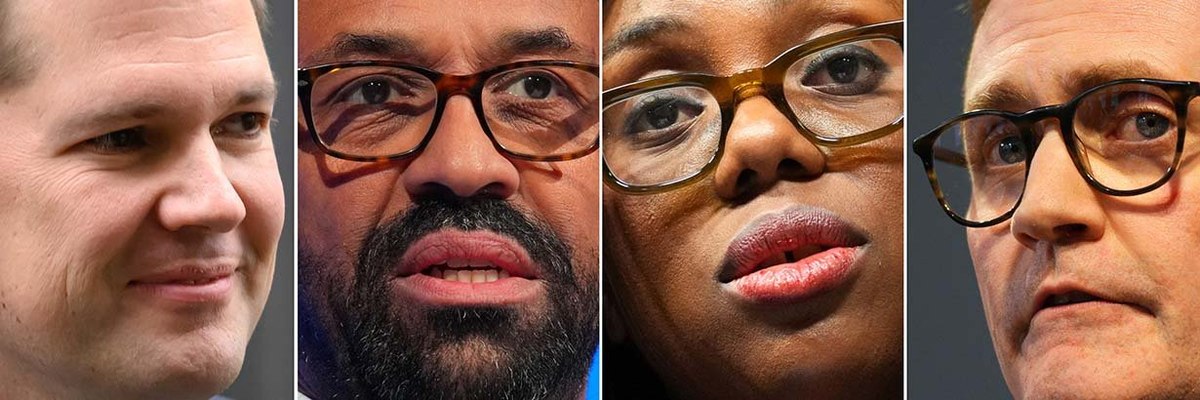The contest is close between Kemi Badenoch and Robert Jenrick – should they prove to be the final two
The final day of the Conservative party conference will see the four remaining leadership contestants making their big speeches to the party faithful. This will likely prove the last high profile event each has before MPs vote on the final two candidates to be put to the membership vote. A new YouGov poll for Sky News has looked at party members’ preferences for leader, as well as their wider views and expectations for the future of the party.
Who do party members want to be the next leader?
Asked which of the four candidates they think would make the best leader, a quarter opt for Kemi Badenoch (27%), with a similar number picking Robert Jenrick (24%), while James Cleverly and Tom Tugendhat trail on 16% each. One in six Tory members (17%) answered “don’t know” to this question.
Of course, members may find that their favoured candidate does not make the eventual vote, with Conservative MPs set to whittle the field down to two final candidates on 9 and 10 October.
That being the case, we asked members how they would vote in a choice between each pair of candidates, in order to simulate each possible contest.
Badenoch emerges ahead in each matchup, although this is within the margin of error when it comes to her contest with Jenrick, at 52% to 48%. The shadow housing secretary also holds an eight point lead over James Cleverly (54% to 46%) and a 16pt lead over Tom Tugendhat (58% to 42%).
Were the final race to be between Robert Jenrick and James Cleverly, then the results indicate that this too would be a close contest, with the former leading the latter by 52% to 48%.
As with Badenoch, Jenrick holds a 16pt lead over Tom Tugendhat (58% to 42%), with the final head to head showing James Cleverly 10pts ahead of Tugendhat by 55% to 45%.
How close do members feel the leadership contenders are to them on key policy areas?
Across five policy areas, Tory members are more likely than not to feel that each candidate has views close to their own stance, particularly when it comes to crime (55-63%).
Ultimately the results are fairly similar across the board, with the most striking difference being on immigration policy. Here we see Badenoch and Jenrick separated from Cleverly and Tugendhat by the largest margin – while 60-61% of members see the former pair as having views close to their own on immigration, this falls to 49-52% for the latter.
Tugendhat typically trails on all measures, particularly on the economy, where he is noticeably separated from the other three candidates (51%, compared to 57-61%).
Values versus electability
Given the choice between a ‘true Tory’ and the best candidate to beat Labour, the party membership opts for the former at a rate of two to one. Asked which is more important, 62% say “that the next Conservative Party leader represents true conservative values” compared to 31% who answer “that the next Conservative Party leader is the candidate best positioned to beat Labour at the next election”.
Those who voted for Liz Truss at the 2022 contest are notably more likely to prioritise a leader that embodies true conservative values than those who backed Rishi Sunak (70% vs 55%).
Here to stay?
Recent Conservative history has seen two Conservative leaders jettisoned before getting a chance to fight an election: Iain Duncan Smith in 2003 and Liz Truss in 2022. The membership are largely confident that the new leader elected in November will go the distance, however, with 83% believing they will definitely or probably lead the party into the next general election.
They are more circumspect on the new leader’s chances of becoming the next prime minister, although the majority (56%) still believe this is likely. Nevertheless, three in ten (30%) see the winner as a luckless figure, who is unlikely to make the move to Downing Street.
Hypothetical leaders and future direction
Aside from the current crop of contenders, YouGov also asked what other hypothetical candidates Tory members might welcome as the new Conservative leader.
Boris Johnson in particular has long been rumoured to be considering a comeback as party leader, a move which would be supported by 50% of party members, compared to 38% who would be opposed.
More popular still is 2022 contestant Penny Mordaunt, who lost her seat at the recent election. Six in ten Conservative party members (61%) say they would support her becoming leader, compared to only 21% who would be opposed.
Suella Braverman seems to have correctly judged the party mood in opting not to stand, with the 36% who would support the former home secretary becoming leader being outnumbered by the 46% who would be opposed.
The most unwelcome figure listed is Nigel Farage, who has spoken of his desire to force a hostile merger of the party with his own Reform UK. The majority of Tory members (56%) would oppose Farage becoming leader, compared to a third who would support it (32%).
Some Conservative figures have called for Nigel Farage to be allowed to join the party; 54% of party members at least begrudgingly agree. Nevertheless, four in ten (40%) say he should not.
Tory members also accept the argument that the party would stand a better chance of regaining power if they did merge with their Reform UK rivals, with 60% saying so compared to only 25% who think this would leave them worse off.
Members likewise tend to believe the future direction of the party should be to move right politically (53%) rather than to head for the centre ground (35%) or to maintain their current position (9%).
Similarly, 50% see Reform UK voters as the primary target group for the party, compared to 27% who think the party should most try and win over Labour voters (27%) or Lib Dems (17%).
How do Conservative party members rate previous PMs?
A further insight into where the party membership’s collective head might be at can be garnered through their opinion of previous prime ministers.
From our list of PMs back to 1979, it is no surprise to see Margaret Thatcher ranked most highly, with 96% of party members rating her a good or great PM (with 76% saying “great” specifically).
The only other former prime minister that most party members rate positively is Boris Johnson, whom 56% label great or good (although only 20% “great”).
David Cameron, John Major and Rishi Sunak all receive similar assessments, with 39-43% seeing them as better-than-average prime ministers. In each case only 20-26% consider them actively poor or terrible prime ministers, with 35-39% branding them ‘average’.
Tony Blair holds a positive performance rating from 34% of Tory party members – higher than Theresa May (28%), Liz Truss (14%) and Gordon Brown (8%). Blair and May are seen as bad national leaders by 42-43% of members, while 67% consider Truss to be a poor or terrible prime minister, rising to 73% for Gordon Brown.
What do you think of the Conservative leadership contenders, the party's chances of winning, and everything else? Have your say, join the YouGov panel, and get paid to share your thoughts. Sign up here.
Photo: Getty










